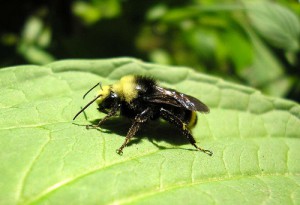Chronic exposure to pyrethroid pesticide negatively affects bees.
When bees forage in agricultural areas, they are exposed to a variety of different pesticides. Neonicotinoid pesticides are known to cause bee death, but now a study in the Journal of Applied Ecology has found that pyrethroid pesticides are also detrimental to bees. Scientists from Royal Holloway University of London examined the effect of chronic exposure to pyrethroid pesticides on bumblebees and looked for additional negative effects when exposed bees were also infected with a common parasite. They found that after colonies were treated with pesticides, worker bees were significantly smaller than bees not exposed to the pesticide. While the results didn’t support any additional negative effect when pesticide-exposed bees were infected with parasites, the authors suggest that this may not be the case in nature. In natural settings, bees are often subjected to additional stresses such as food shortages. As a result, the compounded effects of environmental stressors and parasite infestation may be more detrimental to bees already affected by pesticides.



